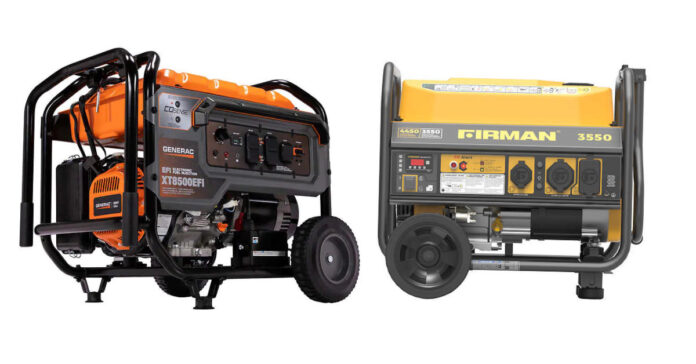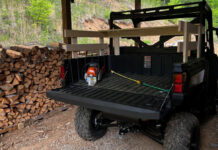Early in my prepping journey, I believed you didn’t need a generator because you just can’t store that much gasoline. Of course, I most likely thought this way because I didn’t have a generator.
Later, I bought a generator, and I now believe any serious prepper should have one. Not necessarily because you will need it during TEOTWAWKI, but because of all the times you will use it between now and then.
The No Generator Years
When I didn’t think we needed a generator, I lived in the Great White North where we didn’t have hurricanes. Most of our weather disasters were blizzards and ice storms, which by definition take place when it is cold. We didn’t need to worry about the contents of our refrigerator spoiling because we could just put the important stuff in a cooler and stick it on the back porch or deck to stay cool. Besides, we were young and had little money, which meant no freezer full of meat to spoil. Plus, the power just seemed to go out less when we lived there.
By not having a generator, your stored gas will last longer. A week’s worth of generator gas will probably power your chainsaw through cutting a couple years’ worth of firewood. That’s a better use of limited resources, in my opinion.
The Generator Years
While living on a three-acre semi-rural property with a well, I invested in a diesel generator that could crank out up to 10KW or power in 120 or 240 volts. This was enough to power the well and the entire house. I went whole hog and built a generator shed and had an electrician install a giant manual transfer switch. I felt like Dr. Frankenstein flipping the switch to power up his monster. Throw in a tank of off-road diesel and a bottle of PRI-D fuel stabilizer, and I considered myself ready. And I was, until I sold the house, and the generator went with it.
Now that we have gravity-fed water, we don’t need so large a generator. I have a small gasoline model that is on wheels. I keep it in the garage and wheel it out when we need it. It is more than powerful enough to run the freezer, the refrigerator, some lights, and a small appliance or two. In our short outages, this has proved to be more than sufficient. Best of all, it seems to sip gas.
My thinking is that in an end-of-the-world scenario when we lose power and there is no hope in hell of it returning in the next few months, we eat, can, and dry as much frozen food as possible so we don’t have to run the freezer too long.
I am still considering buying a solar generator and a kilowatt or more of solar panels to power the freezer or the fridge. The generator makes enough power that we could run it for a few hours, and chill down the freezer at the same time we charge up the solar generator’s batteries.
Dollar wise, I’m just not there yet.
The Downsides of a Generator
Besides being gas hogs, generators are noisy. In a neighborhood where every other house has one, that’s no big deal, but in the country, that sound can carry. The question is, who will it attract? Will it be your kindly neighbor who want to keep her insulin cold, or the rowdy bunch that want you to take your generator home to keep their beer cold? I keep mine chained to an 8-inch timber holding up our deck to discourage the casual, opportunistic thief, but anyone serious will just cut through the generator’s frame.
Consider that a warning to up your level of personal defense when you run your generator because it might make you a target in a world where every other man-made device has gone quiet.
Do YOU Need a Generator?
If you are a new prepper, I’d stock up on food and water before I bought a generator. They are useful for short-term emergencies and with the threat to our power infrastructure growing, they may be even more useful in the future, but food takes precedence. I think generators are best for people who are handy, have a basic understanding of watts and volts, and some experienced with small engines. Generators are rarely used, so it’s not unusual to find it won’t start when you need it. Maybe you left some old gas in the carburetor and it gummed things up. But fuel hoses get old and rot, wires short out, and one day you just won’t get a spark and can’t figure out why.
Nonetheless, they sure are handy. It may be worth the $800 or more to pick one up at the big box store. It will make you seem like a hero when the kids are angry after twelve hours of no power.
In a post SHTF situation, there may be times when it is worth the gas to power up the generator. Maybe you need to run the table saw or welder for a critical project. Having it available on an emergency basis could be helpful.
What to Avoid
Whatever you do, never run a generator inside your house. To avoid carbon monoxide poisoning, make sure its exhaust is pointed away from your house and your family.
I am also against running them for 24-7 or even most of the day. Run it a few hours in the morning and a few hours at night. If generator power is the only way to run your heater, then run it one hour one, two hours off. You need to make that fuel last, even if it’s not the end of the world.
That brings up the point of the whole-house generators that are hooked up to a natural gas pipeline or propane tank. I don’t recommend running them all day and night if you think the SHTF. If you are on natural gas, I guess you may as well, because you may never get a bill and the supply will end at some point. But if all the fuel you have is whatever propane is left in your tank? Don’t waste it keeping that thing idling while you sleep.
If you decide to buy a generator, size it smartly and use it wisely. And be sure not to burn every last drop of fuel trying to preserve the semblance of a world that is lost.







